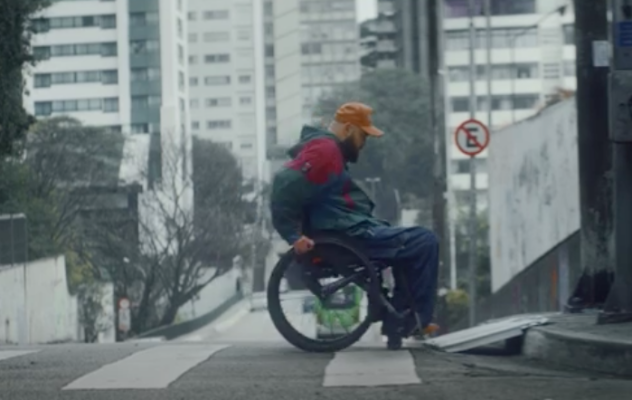
Is the Industry Finally Open to Accessibility?

Is there anything more telling of where the industry's at than a Cannes Grand Prix winner unable to take to the stage to collect their award because of a lack of wheelchair accessibility? And the kicker? The winner Eldar Yusupov was a copywriter from McCann Israel who was inspired by his experience of severe cerebral palsy to devise IKEA Thisables.
The good news is that the work was so moving that it earned the agency a brief from Coca-Cola almost immediately. Less good is the reality that it throws into stark relief the gap between the industry’s creative ambition and the reality of its lagging effort.
However, accessibility was a massive trend in the winning work, which shows that agencies and brands are thinking more about disability, an inclusion issue that will affect us all at some point. And that juries are interested in rewarding such efforts.
Work that tackles accessibility was largely product design-centred work, whatever category it shook out in at Cannes. It's not the first time that such work has done well at Cannes, but this year it spreads beyond the realm of Health and Pharma and crops up in all sorts of categories. In terms of representation in more traditional ads, the industry is still slow-going, though Unilever’s Aline Santos has vowed that disability is the brand's next key focus for the company's Unstereotype project. One in five people are officially registered as disabled, though infirmity and the struggles of navigating inaccessible services affects most at some point in their life.
But well-meaning output is still unmatched by efforts to make the creative industries more accessible to more people. Ableism is a structural issue within the industry and not one that can be fixed with a handful of winning campaigns. Nonetheless, the bulk of accessibility-centred work that was created, entered and rewarded this year is still a significant statement.
Which is why the Design Lion Grand Prix is at least interesting. Google Creatability is a startup that explores tools that can make creativity more accessible using AI and the web. Richard Ting, RGA’s global chief experience officer and president of the Design Lions jury, said: “One of the reasons we thought that project deserved it was for creating a platform that was scalable to everyone that in the accessibility community and was actually creating new creative tools that we as creatives are not accustomed to right now. If you think about it, we as creatives come to our day-to-day jobs and use our laptops and if you can’t access these devices you’re pretty much shut out from this world of creativity. If you think about this festival - which is a celebration of creativity - we’re only celebrating people who have access to those tools.”
And while there’s been lots of to-and-fro about the pros and cons brand purpose at Cannes Lions 2019, for the juries who awarded accessibility-related work this week it was about something somewhat bigger. Says Myles Lord, managing creative director at Serviceplan Berlin and member of the Direct jury: “We’re so politically correct and quite polarised but sometimes we’re focusing on non-topics and there are these glaringly obvious things. So it’s great that this year people are opening our eyes. We’re not trying to wrap our arms around the world anymore. We’re just saying that we’re blocking people if we’re not giving them access.”
Sander Volten, CEO of 180 Kingsday agrees. “When we talk with our clients we talk about famous, human, seamless. The work needs to make them famous, it needs to make a true human connection and then be seamless - people need to have your brand in their life without it being annoying. That’s similar to the accessibility conversation, how we make a brand a natural partner in people’s lives.”
Accessibility Work that Won
Creatability - Google
Design Grand Prix is an open source range of experiments that explores different creative beyond the mouse and stylus to make digital creativity more accessible to more people - and re-imagine the future of creative worktools.
Adaptive Clothing - Tommy Hilfiger
The fashion brand took a look at how to make their clothes easier to put on for people with all sorts of physical disabilities.
ThisAbles - IKEA
McCann Israel took the Grand Prix in Health and Wellness, Gold in Design, Brand Experience and Activation, Direct. Silver in Innovation and more.StorySign - Huawei
This app helps deaf children learn how to sign and bonds parents and kids over bedtime stories. It took a clutch of awards including Gold in Brand Activation and Experience, Health and Wellness, and Mobile.The Accessibility Mat
GTB Brazil creates a car mat for Ford.
Changing the Game - Microsoft
McCann won the Grand Prix in Brand Activation and Experience, Gold in Design, Innovation and a Titanium Lion.SeeSound - Wavio
Where object recognition is becoming an industry standard, this device identified sounds. It took Grand Prix in Innovation and Gold in Mobile, and Bronze for Creative Data. It was made by Area 23, a company within the FCB Health Network Company.7:1 Collection - HomePro
This collection from BBDO Bangkok used high contrast colours to create a collection that would be easy for the visually impaired to use and navigate. It won a Bronze in Design.













